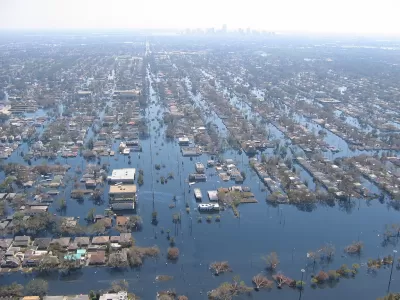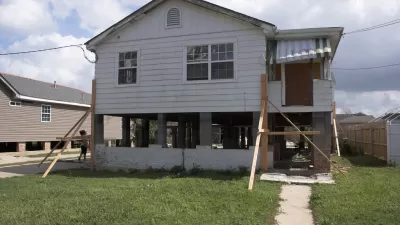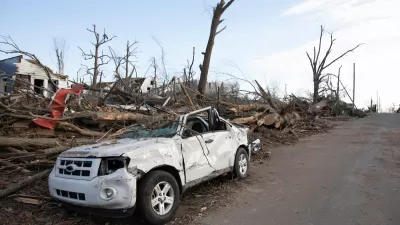Recently released flood maps created by FEMA for the city of New Orleans are receiving criticism for being 'overly optimistic' when it comes to risks posed by hurricanes and rising sea levels.

In an Op-Ed in The New York Times, Tulane University professor Andy Horowitz finds fault with the recently released flood maps for New Orleans that downplay risks in potentially vulnerable neighborhoods across the city. Horowitz writes that FEMA's original flood maps, drafted in 2009, were redrawn following complaints by New Orleans officials that they failed to take into account the new levee protections built after Hurricane Katrina. The new maps show no flood risks in many of the neighborhoods that flooded during Katrina, meaning homeowners in those neighborhoods no longer are required to buy flood insurance. Horowitz sees a potential catastrophe in the making.
[M]any of us will hold our breath through hurricane season nonetheless, because we know that the new maps reflect questionable assumptions. First, they assume that this time the Army Corps of Engineers’ work can be trusted, and the levee system will not fail again. ...a likely outcome of this new federal policy is that when — not if — New Orleans floods again, thousands of people will be worse off than they were during Hurricane Katrina: When their homes flood, they will not have flood insurance.
FULL STORY: New Orleans’s New Flood Maps: An Outline for Disaster

Planetizen Federal Action Tracker
A weekly monitor of how Trump’s orders and actions are impacting planners and planning in America.

Maui's Vacation Rental Debate Turns Ugly
Verbal attacks, misinformation campaigns and fistfights plague a high-stakes debate to convert thousands of vacation rentals into long-term housing.

San Francisco Suspends Traffic Calming Amidst Record Deaths
Citing “a challenging fiscal landscape,” the city will cease the program on the heels of 42 traffic deaths, including 24 pedestrians.

Defunct Pittsburgh Power Plant to Become Residential Tower
A decommissioned steam heat plant will be redeveloped into almost 100 affordable housing units.

Trump Prompts Restructuring of Transportation Research Board in “Unprecedented Overreach”
The TRB has eliminated more than half of its committees including those focused on climate, equity, and cities.

Amtrak Rolls Out New Orleans to Alabama “Mardi Gras” Train
The new service will operate morning and evening departures between Mobile and New Orleans.
Urban Design for Planners 1: Software Tools
This six-course series explores essential urban design concepts using open source software and equips planners with the tools they need to participate fully in the urban design process.
Planning for Universal Design
Learn the tools for implementing Universal Design in planning regulations.
Heyer Gruel & Associates PA
JM Goldson LLC
Custer County Colorado
City of Camden Redevelopment Agency
City of Astoria
Transportation Research & Education Center (TREC) at Portland State University
Jefferson Parish Government
Camden Redevelopment Agency
City of Claremont





























